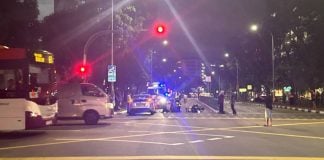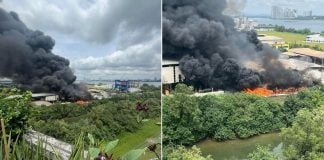Political Parties Who Don’t Agree With The Government’s Approach To Reserves Should Let Voters Decide: PM
Prime Minister Lee Hsien Loong yesterday (7 Feb) fired a salvo to his political opponents in an intense debate that saw Members of Parliament (MPs) from both sides of the House spar over the Government’s management of reserves.
“Ultimately, in a democracy like Singapore, on big issues like this, it is the people who will decide,” he said. He added that the People’s Action Party (PAP) is convinced this is the right approach for Singapore. “As long as the PAP government is in power, this is what we will do,” said PM Lee, who is the Secretary-General of PAP.
If any other political party thinks that this is not the right approach, if they truly believe that we should dip into our reserves more, then bring it to the ballot box. Put it upfront. Say you want to touch, you want to spend, you want to shift the rules. Don’t pretend that you’re just as prudent, only more kind-hearted.
PM Lee added that the political parties should campaign on this issue in the next General Election and ask voters for a mandate to form the Government, change the Constitution, and dismantle the second key.
He is referring to the “two-key system” of protecting past reserves, with the Government and the president each holding one key. The Government would be able to tap on past reserves only if the President gives his approval.
“Put this squarely to the people, and let them decide,” said PM Lee. “The PAP will join issue with them, and convince Singaporeans that our way is the right way for Singapore.”
Debate Followed Motion On Public Finances Filed By PSP
PM Lee was speaking in the debate on a motion filed by the Progress Singapore Party (PSP) on Singapore’s reserves and budget policies.
Non-Constituency Members of Parliament (NCMP) Leong Mun Wai and Hazel Poa, both PSP members, said they believe a continued accumulation of reserves hurts the welfare of present day Singaporeans.
Mr Leong urged the Government “to review its current budget and reserve accumulation policies to help Singaporeans today reduce their financial burdens and improve their quality of life, while continuing to save for future generations”.
The reserve accumulation system has a cost that “comes from the sacrifices of Singaporeans”, said Mr Leong.
“The cost of accumulating reserves was tolerable when our economy and incomes were growing rapidly,” he said. “However, as economic fundamentals change, there comes a point when the welfare of present-day Singaporeans will be hurt if we continue accumulating the reserves at the same rate, as we are doing now.”
High cost of living, growing social inequality, mental health issues and declining fertility rate are examples of social ills that have resulted from economic policies, he said. The Government should do more to address these social ills, he added.
“Singaporeans have the right to know much we are accumulating reserves, how we are using the reserves and how much we are leaving behind for future generations.”
The original motion was supported by MPs from the Workers’ Party (WP).
WP chief and Leader of the Opposition Pritam Singh said the Government should be more open about the reserves and “reveal figures not for their own sake, but so as to facilitate mature conversations on the reserves to take place”.
He added: “As long as the PAP takes the position that the reserves must be kept a secret, reasonable members of the public will query whether this is not simply a cover for an overly-conservative treatment of reserves to fob off political demands for social policies that can benefit Singaporeans.”
He also urged the Government not to rule out using more than the current 50% of the Net Income Returns Contribution (NIRC), or what is known as the investment returns from the reserves, to lessen the taxation burden on Singaporeans.
Referring to a study by the Institute of Policy Studies (IPS) in August last year, he said there are other Singaporeans today who can conceive of greater flexibility in increasing the spendable amount of the NIRC.
Later, PAP MP Liang Eng Hwa proposed amendments to the motion, removing the call for the policies to be reviewed.
The amended motion called on the Government to “ensure its budget and reserve accumulation policies would always stay fiscally responsible and sustainable”, and replaced “saving” for future generations with “planning and providing”.
Second Minister for Finance Indranee Rajah supported the amended motion and refuted Mr Leong’s comments, saying it’s not true the Government is over-accumulating reserves at the expense of Singaporeans and unfairly prioritising future generations. It’s also not true that Singapore has plenty of excess fiscal resources.
“We are prudent in our spending while doing our best to ensure we meet the needs of our people. We generate revenues to cover recurrent expenditures so as to avoid burdening Singaporeans with debt… Our reserves help current and future generations of Singaporeans.”
Hard-earned savings if not properly protected could be easily and unwisely spent
In his speech, PM Lee reiterated the need to safeguard the national reserves, stressing that it is important not to unwisely squander what has been saved by previous generations.
He also said it’s a misconception to think that having a certain amount of reserves is enough.

Source: MCI Singapore on YouTube
“How much is enough? To me, that is the wrong question to ask… There is no such number,” he said. He added that it is unclear what crises the nation will run into, citing past events such as the global financial crisis and Covid-19 as examples, as well as the possibility of war.
“We can never say for sure how much is enough, because we do not know what kind of crises we will face in the future, or how our investments will fare,” he said.
Recalling founding Prime Minister Lee Kuan Yew, PM Lee said the former had anticipated political pressure that would demand more Government resources, which was why the two-key system was designed. “It is up to us and for us now to prove that we can protect the nest egg, and that Singaporeans are capable of being prudent and responsible well beyond the founding generation.”
Opposition ‘changed its tune: PM
PM Lee added that former WP chief Low Thia Khiang had in 2009’s Budget debate questioned why the Government wanted to draw down on past reserves, instead of using savings from the Government’s current budget. In 2011, Mr Low commended the Government for “prudently” putting back into the past reserves the money it had taken in 2009.
“This is how a responsible Opposition conducts itself,” he said, adding that there was “a common commitment” to safeguard past reserves and a shared recognition that they are a “strategic asset only to be used for unprecedented circumstances”.
He added: “Now I hear the opposition arguing that we should change the rules and draw more from reserves, and that of course they have no intention to raid the reserves… They say we can easily afford what they are proposing. I conclude their tune has changed.”
Mr Singh countered PM Lee’s point, saying different times called for different measures.
“I can understand the political urge to cherry-pick what Mr Low says, I understand that, but Mr Low has also shared many views on the GST in this House, so I hope to hear the frontbench quoting him on the GST in future.”
PM Lee responded in the affirmative, saying” Yes, indeed, [Mr Low] did regularly oppose the GST every time. Introducing it at 3% pushing it up from three to five, which I did, going from five to seven which Mr Tharman did as Finance Minister. And we reminded the WP of this, only to be told by your ex-MP Mr Leon Perera that now that it has reached 7%, you don’t oppose that, but you oppose going to nine.”
He added: “So the Hansard is an open book we can all refer to it readily. And soon we will be able to do a generative AI search on it and all these facts will come up and I am not hallucinating.”
PM Lee hopes to pass the system onto his successor
In his speech, PM Lee pointed to the same IPS study mentioned by Mr Singh, saying that the survey showed Singaporeans have high confidence in the PAP Government’s management of the reserves. “Therefore, we are confident that we will win the argument, and we’ll be able to get Singaporeans to do the right thing.”
He said he has spent 40 years of his life stewarding, safeguarding and improving the reserves system, and continuing the work of those who had came before him.
“Taking a long term view of the reserves, and striking the right balance between present and future needs – these are vital responsibilities of any Singapore Government… Now I am preparing to hand over to my successor in good order a Singapore which is more prosperous and more secure.”
Have news you must share? Get in touch with us via email at news@mustsharenews.com.
Featured image adapted from MCI Singapore on YouTube.











